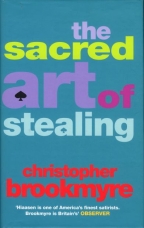While Christopher Brookmyre's latest novel is titled 'The Sacred
Art of Stealing', and with good reason, the opening passage -- and
many to follow -- demonstrate that Brookmyre himself is a master of
the profane art of ranting. Any readers left standing after the
prose-as-a-machine-gun volley that begins the book are in for a
treat. In his seventh novel, Brookmyre brings back Angelique De
Xavia, the heroine of 'A Big Boy Did It and Ran Away' and presents
her with a delicious romantic and criminal conundrum: What do you do
when you're the cop and you fall for the robber? Remembering, of
course, that in Brookmyre's skewed universe, to quote the character,
"Just because I'm a bank robber doesn't mean that I'm the bad
guy."
The plot is a crackerjack magic box that unfolds with the
precision of a mega-budget action thriller. Once the opening salvoes
are fired, Brookmyre lays out a robbery-with-hostages situation that
is both hilarious, touching and filled with electric-wire tension.
And rants. Oh yes, the rants. With Brookmyre, most of the fun is in
getting there. If the first paragraph doesn't have you calling up
your friends to read it into their voicemail, then you can go
directly to Angelique, who will deliver her take on romance shortly.
Because, between all the misdirection, the magic, the
clever-as-clever-one-could-possibly-hope-it-to-be staging of the
robberies, the reversals and the police poltroons that De Xavia is
forced to work with, 'The Sacred Art of Stealing' is a romance
through and through.
As a romance, it's forced to live or die based on the attraction
of the readers to the characters, not the attraction of the
characters to one another. It's a romance; that's a given. But
Brookmyre succeeds by not making his characters easily likable.
They're simply realistic people who have been pushed beyond all
bounds and found themselves in a room pointing guns at one another.
They have their reasons for doing so, good and bad. The reader will
buy them, their predicament and even the souped up solution because
Brookmyre makes the whole thing go down so damn easy. His confidence
in the characters carries them together through the sophisticated mix
of surrealist art and hi-tech crime hi-jinks he has in store. It's a
natural partnership.
Brookmyre doesn't pull his punches, which in the end makes his
work much, much stronger. In the interim, however, some readers may
find themselves put off by his in-your-face ranting. If it weren't so
damn well written, so damn witty, there'd be a problem, because
Brookmyre pushes it to the limit, then finds himself looking over his
shoulder at the limit. He's a remarkably skilled writer, however, and
he saves himself from his turn-it-to-11 inclinations by that old
standby of the writer, great writing. Just when you think you're
hearing the writer himself speak, you'll find he's heavily in
character, and in a character who is so enjoyably over-the-top that
the reader will welcome every chance to hear him have a go.
Brookmyre also devotes a fair amount of the narrative to musings
on sports, in this case the Rangers, a long-losing but loved local
football club. Angelique's fascination with them rounds out her
character in unexpected ways, and Brookmyre does an admirable job of
unearthing the universal feel of the low-rated losing sports team.
American readers who still can't spell the word soccer without a
spell-checker may find themselves a bit nostalgic for football as
they know it. Don't worry, you can apply Brookmyre's sports rants
with only a few easy translations.
'The Sacred Art of Stealing' is a fascinating concoction, part
magic-trick, all misdirection, part romance, part page-turner.
Brookmyre constantly and effectively pulls the rug out from under the
characters and the reader, casting every statement into doubt,
resolving those doubts then replacing them with new ones. In the
interim, readers will laugh out loud often enough to be embarrassed
if they're riding on public transportation. Whether you're laughing
because you care -- or you care because you know you'll laugh -- is
immaterial. Great writing trumps all obstacles. Oh, and have no doubt
-- 'The Sacred Art of Stealing' has a lovely little jab at the
Christian right, the kind of masterful comeuppance that Brookmyre
readers have learned to expect. And you'll remember I told you so. Oh
yes.
